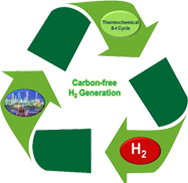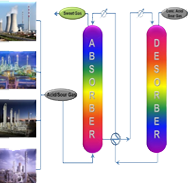Advanced Gas Separation group undertakes studies related to separation processes for gaseous streams. Currently our main focus is on the following areas
Thermo-chemical hydrogen generation
Petroleum refineries are associated with different refining processes for manufacturing environment friendly usable petroleum products. Crude oils being processed today are getting sourer and heavier resulting in increased use of hydrogen and correspondingly increased production of hydrogen sulphide. Thus, there is a dual scenario in today’s refining industry: an increased production of H2S and increased demand for hydrogen. The thermo-chemical, sulphur-iodine water splitting route for hydrogen production is a high energy requirement process and suited to mostly nuclear plants. However, the thermo-chemical pathway of splitting H2S is a promising pathway for carbon-free hydrogen production that can be used in existing refineries.

Gas-liquid CO2 absorption
Development of efficient approaches for capturing CO2 to minimize its accumulation into the atmosphere is an area of current research interest from both the environmental and economical point of views. The removal of CO2 gas, solvent absorption using amine-based solvents has been widely studied and utilized for various technologies and processes. However, the development of promising absorbents is a continuous exercise to make this process more economical for industrial applications.















